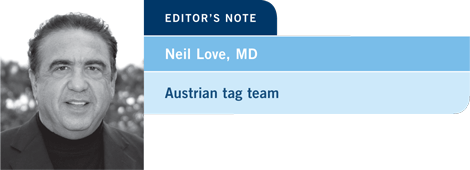
 |
||||||||

When the 2008 American Society of Clinical Oncology (ASCO) program arrived at my doorstep in mid-May, I was struck by the plenary session’s distinct and somewhat unsettling European flavor (Figure 1). There, first in the lineup, in ASCO’s highest-profile position, was an update of a well-known trial, ABCSG-12, studying adjuvant ovarian suppression combined with tamoxifen or anastrozole, alone or in combination with zoledronic acid (ZDA), in premenopausal women with ER-positive, Stage I and II breast cancer. I noted the familiar name attached to this presentation: Michael Gnant, the Viennese breast cancer surgeon first interviewed for this series at the 2004 San Antonio Breast Cancer Symposium.
The abstract to the latest update of this trial wasn’t posted — and wouldn’t be until the first day of the meeting — but my assumption was that the study had been given top billing because of the endocrine question. However, when a prominent breast cancer investigator visited our office in Miami a week or so before ASCO, he intimated (off the record) that the paper might have a few surprises, but he refused to respond to my gentle arm-twisting about the details.
With that thought in the back of my mind, I headed out to ASCO and after the usual delayed landing at O’Hare was quickly on the way to our first interview with prostate cancer researcher Nancy Dawson. To my surprise, our conversation began with Nancy asking if I had seen the Austrian breast cancer paper that had just been posted.

Needless to say, I opened up my computer, went right to the ASCO website and was soon on the phone trying to track down Dr Gnant. When Mike arrived at our temporary recording studio the day after his presentation, he joked that this would be approximately his 200th interview in 24 hours. He also noted that most of those had been simply to acquire a media sound bite or two and that he was prepared to and would enjoy spending a long time together dissecting the details of this historic paper.
Of course, the “late-breaking news” here is that ZDA and not anastrozole lowered the relative risk for relapse — in this case, by a stunning 35 percent. Our discussion was much longer than the time allotted to the presentation the day before, as we reviewed this complex data set. Dr Gnant started by commenting that although none of these young women with node-positive and node-negative tumors had received chemotherapy, only about six percent had experienced cancer relapse at five years. This suggests yet again that optimal endocrine therapy and not chemo is the key to management of ER-positive, HER2-negative disease.
During our chat, Mike and I covered a variety of topics, including Martine Piccart-Gebhart’s spectacular “seed and soil” discussion that followed his presentation. I also reminded him of another European Mike — Michael Baum — who had essentially predicted this moment at the 2001 San Antonio meeting, when he presented for the first time initial findings from the ATAC trial demonstrating an advantage for anastrozole compared to tamoxifen in postmenopausal women. The only major downside reported at that time was an increased risk of fracture.
The same morning as Dr Baum’s talk, Trevor Powles presented findings from a UK trial suggesting, but not proving, that adjuvant clodronate lowered the rate of breast cancer recurrence. Dr Baum — whose passion for clinical science had an enormous impact on the field in the 1980s and 1990s — challenged the San Antonio throng to consider a future matrimony of a bisphosphonate and an AI that would solve not only the bone problem but also perhaps much more.
As is often the case in oncology, there have been a variety of responses to the 2008 Austrian ASCO ZDA data set and what it means to daily practice. During our interview, Mike G commented that “If my sister had ER-positive breast cancer, I would recommend zoledronic acid.” However, Dr Piccart-Gebhart cautioned from the podium to wait for more data, which should be available this year.
Perhaps more important than the current clinical stance of investigators is the possibility that we are witnessing a major paradigm shift in breast cancer treatment, particularly because of the quite unexpected finding that the use of ZDA was not only associated with fewer bone mets but also fewer metastases at other sites and fewer contralateral breast primaries. This led Martine to speculate that bisphosphonates may have antitumor activity, both to prevent metastatic implantation (ruining the soil) and at the same time perhaps having a direct antitumor effect (striking the seed).
With so few events in the Austrian study, most people agree that the issue of optimal hormone choice needs more data and the continuation of existing trials like SOFT and TEXT, but Dr Gnant pointed out that even if other studies don’t demonstrate a recurrence advantage with AIs versus TAM for ovarian-suppressed patients, the Austrian data confirm prior findings for postmenopausal women demonstrating fewer thrombotic events and endometrial cancers in patients receiving the AI. Another critical observation presented in Chicago was that ZDA given according to this schedule and at this dose was not associated with any confirmed cases of osteonecrosis of the jaw.
Dr Gnant was followed to the podium by an Austrian colleague, Dr Robert Pirker, who also met with me for an interview at ASCO as part of our lung cancer audio series. Dr P presented the much-discussed FLEX trial in non-small cell lung cancer, which demonstrated a five-week survival advantage with the addition of cetuximab to chemotherapy as first-line therapy of metastatic disease.
Although I was initially underwhelmed by this modest advance, Dr Pirker was able to convince me that at the least this option needs to be discussed with patients — particularly those who would not have met the entry criteria for the ECOG-E4599 study of paclitaxel with bevacizumab, such as patients with squamous cell cancer.
The other two ASCO plenary talks included a UK-led equivalency trial of carbo versus radiation therapy in Stage 1 seminoma and a paper by Belgian investigator Eric Van Cutsem on the value of K-ras status in identifying patients with colorectal cancer who don’t benefit from cetuximab — both worthwhile advances that are unfortunately not likely to result in more immediate cancer cures.
Walking out of the session that Sunday afternoon, I was distraught that the most financially fortunate country on the planet was so underrepresented at the podium, and that ASCO 2008 in general failed to come up with any Gleevecian home runs.
It is curious and discouraging that 35 percent of Austrian women with breast cancer enter clinical trials compared to less than five percent in the US. In our conversations since 2004, Dr Gnant has repeatedly reminded me that the reason his country of only eight million people has contributed so much to cancer research is that, well...they think it’s important.
If the ZDA-bisphosphonate adjuvant story plays out, it is a cause for some optimism, and one can argue that more recurrences will be avoided even than with trastuzumab, but we need a lot more steps forward to see the beginning of the end to this merciless disease.
The more likely future of cancer research is that the status quo will continue, and I will crawl back in my CME hole and try not to remember that the resources and talent exist in this country to squash the cancer problem under our soles like a bug. If in the future we somehow do get our act together, ASCO and its plenary and other sessions will be bringing much more hope to desperate patients and weary oncologists.

— Neil Love, MD
DrNeilLove@ResearchToPractice.com
August 11, 2008
EDITOR'S NOTE
Austrian tag team
Neil Love, MD
- Select publications
INTERVIEWS
Michael Gnant, MD
- Select publications
Hyman B Muss, MD
- Select publications
Matthew J Ellis, MB, BChir, PhD
- Select publications
Charles L Vogel, MD (Fellows Rounds)
- Select publications
Breast Cancer Update:
A CME Audio Series and Activity